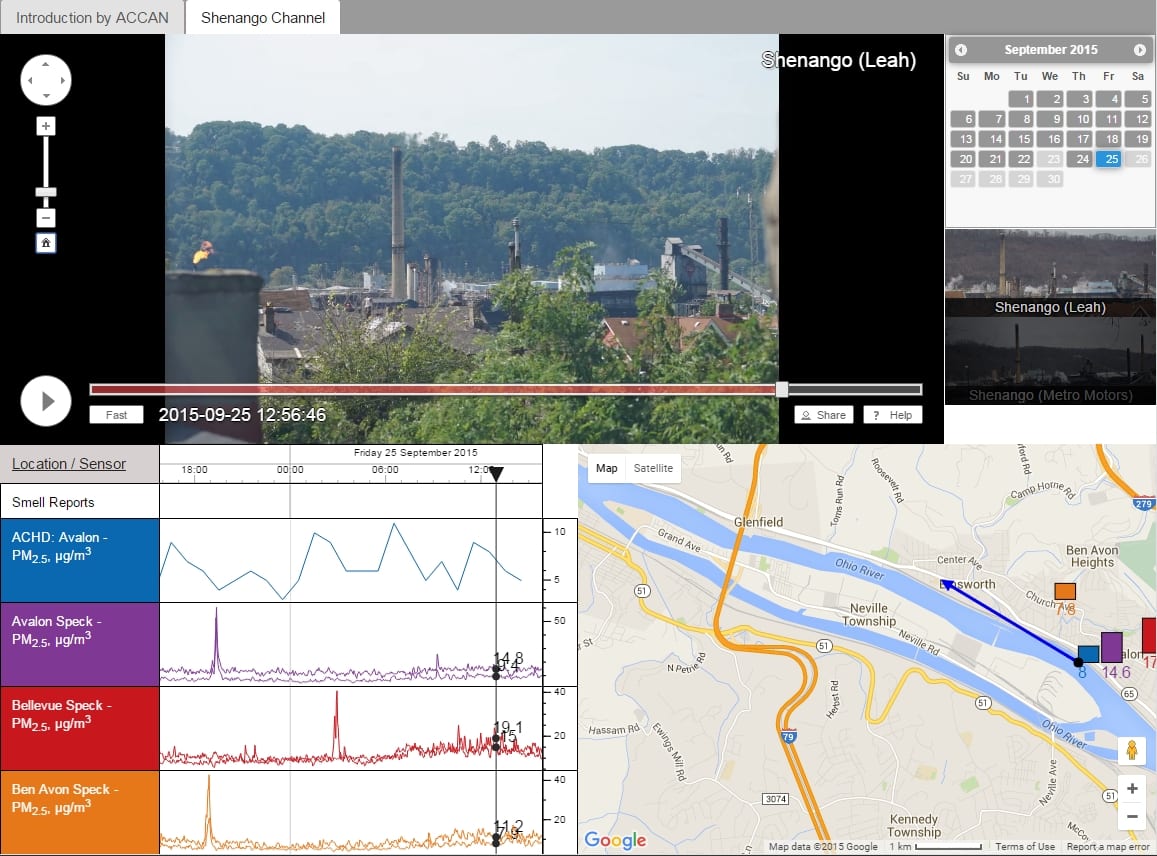
Partnership Wins Award for Using Tech to Track Pittsburgh Air Pollution
By Amanda Waltz
March 2, 2021

Pittsburgh is no stranger to dirty air, as year after year, studies from organizations like the American Lung Association list the city as having some of the worst air quality in the country. While some may argue that the one-time steel capital is in a better state than it was decades ago, others are not willing to accept rampant pollution as a way of life. Now one local partnership fighting for clean air has earned major recognition for its efforts.
On Feb. 24, the grassroots advocacy group, Allegheny County Clean Air Now (ACCAN), and Carnegie Mellon University's CREATE Lab accepted the first-ever Constellation Prize for their collaboration on the Shenango Channel, an online resource that tracked pollutants from a now-defunct coke works near Pittsburgh.
The Constellation Prize was created by a group of engineers and social scientists to celebrate accomplishments in “policy impact, creative community collaborations, biodiversity and indigenous rights, and engineering education,” according to the award's website.
Gwen Ottinger, an associate professor in the Department of Politics at Drexel University, nominated CREATE Lab and ACCAN for the award, saying in a press release the Shenango Channel "exemplifies successful collaboration between engineers and a 'frontline' community and shows how thoughtfully co-designed technology can empower citizens to advocate for social change.”
The Shenango Channel was an offshoot of Breathe Cam, a network of cameras that the CREATE Lab uses to monitor visible air emissions in Allegheny County. It's also part of the Breathe Project, a program of the Community Foundation for the Alleghenies that receives support from the Heinz Endowments.
Many credit the Shenango Channel as having a key role in the 2016 shutdown of Shenango Coke Works, a steel-making facility that operated for over 50 years on Neville Island. Leading up to its closing, ACCAN members banded together and set out to prove that the site was affecting their quality of life, from producing bad, rotten egg-like smells to triggering breathing problems and respiratory illnesses.
The problem was trying to prove that these issues were, indeed, being caused by the pollutants being pumped out by Shenango Coke Works. So ACCAN recruited CREATE Lab, a part of CMU's Robotics Institute, to help set up cameras that would record high-resolution video of the plant 24 hours a day. From there, they cataloged thousands of incidents where emissions from the plant were far higher than what was legally allowed.
The videos, along with other measurements of pollutants and reports of unusual smells, were shared by the public on the channel's website. Eventually, the Allegheny County Health Department (ACHD) cited the plant's owner, DTE Energy, for violating pollution laws.
After being closed, the facility was imploded in 2018.
Ana Hoffman, CREATE Lab's director of air quality engagement, says ACCAN did much of its work manually, using the channel footage and air monitoring tools to log bad pollution events in a blog, and sharing that information with the ACHD.
“I think ACCAN, in so many ways, is one of the most impactful grassroots organizations that I've seen in Pittsburgh,” says who describes their approach as combining “completely sustained engagement with regulators,” technology, and community outreach. “This model that they've developed, I hope that it can be a model for other community groups.”
But as industrial polluters continue to operate in the region, so do ACCAN and CREATE Lab.
“Industrial pollution is a countywide problem that reaches everywhere, frequently,” says Hoffman, adding that the region experiences 157 inversion days – times when atmospheric conditions trap high levels of pollution closer to the ground – per year.
The Shenango Channel project helped lead to the 2018 expansion of Breathe Cam into the Monongahela Valley south of Pittsburgh, where cameras constantly monitor three plants in U.S. Steel's Mon Valley Works.
Hoffman says ACCAN is also “laser-focused” on the pollution and explosions coming out of Metalico Pittsburgh, a scrap metal recycling facility on Neville Island. Another area of concern, she says, is the Cheswick Generating Station, a coal-fired electric plant in Springdale that has been cited by the ACHD for violating emission limits.
Hoffman believes tools like Shenango Channel could empower the public by allowing them to contribute to and gather data-driven evidence against polluters. CREATE Lab also developed Smell Pittsburgh, a crowd-sourcing app where users can report bad smells in their communities. A map then visualizes the number of and severity of reports, which are shared with ACHD.
CREATE Lab is also releasing Plume Pittsburgh, a new tool that maps the origins of pollution of how it spreads
For now, though, Hoffman says the Constellation Prize win allows them to “take a breath” and acknowledge the work they have done so far with ACCAN.
“We plan to continue to work with ACCAN for as long as they want to work with us,” says Hoffman. “The relationships that we formed there are awesome and steadfast.”

Leave A Comment